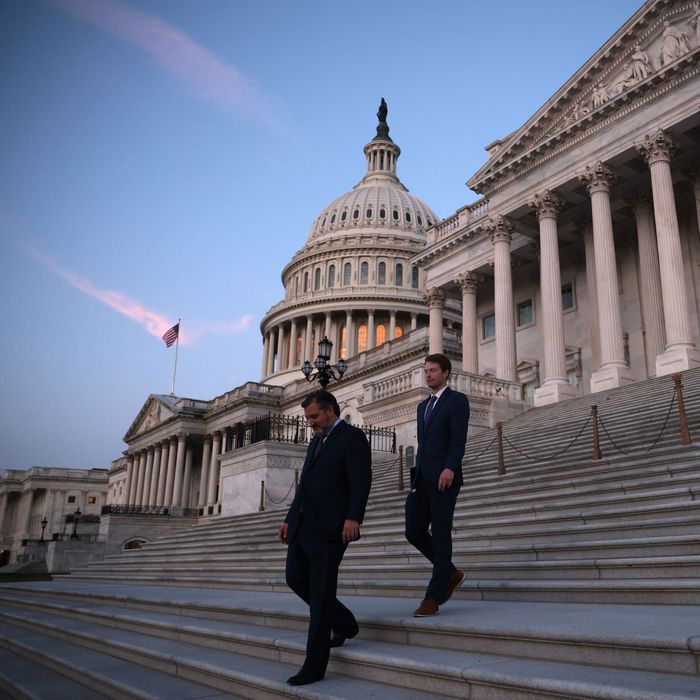
What a difference a year makes.
As Senate Democrats this week moved forward with a $3.5 trillion budget resolution, Republicans did their best to enliven the proceedings with political theater. To the Dems’ bemusement, GOPers demanded votes on amendments that were meant to attach a public-relations cost to Joe Biden’s signature legislative effort. At least two of these involved policing: an amendment from Josh Hawley of Missouri to provide grants to localities for hiring 100,000 more officers; and one from Alabama’s Tommy Tuberville aimed at denying federal dollars to places that “defund the police.”
“This is a gift,” Cory Booker of New Jersey chortled, just before the Tuberville amendment passed 99-0. (Hawley’s passed 95-3.) “I am sure I will see no political ads attacking anybody here over ‘defund the police’ [anymore].” It was a no-brainer: Democrats got to refute GOP talking points by making their position clear with votes, and Booker got to hug Tuberville, all while avoiding legislative consequences. (The amendments, like the resolution and the hug, were nonbinding.)
But this night of theater was meaningful in other ways. A year ago the U.S. underwent a “racial reckoning” that was supposed to change how people understood the role of race in American society, and policing in particular. So far, congressional Democrats have made more progress flushing money into cops’ pockets, and laughing off the loftiest demands of the movement at the center of the upheaval, than they’ve made fulfilling even its most modest requests. In this way, despite generally fierce polarization, bipartisan agreement on criminal justice is staring to assume a familiar shape. This is great news for America’s police.
The federal law enforcement reform bill that congressional Democrats slapped together in response to the protests has stalled without Republican cooperation. Party leaders have pivoted in their messaging from broad support for the movement’s grievances against the police to a full-throated celebration of cops’ innate heroism, which has entailed promising them lots more money with no strings attached. At the very least, this would’ve seemed bafflingly tone-deaf a year ago, perhaps unthinkably so. Today, it calls into question the very durability of a reckoning that, for all its bombast and self-congratulation, always seemed unlikely to last.
The scope and stridency of the outcry after George Floyd’s murder was encouraging. But it suggested that a unique, and therefore tenuous, confluence of factors had made it possible, including a then-novel pandemic that the government was openly lying about; a president who inspired anything from disappointment to rabid loathing in most Americans; and a rapid-fire sequence of horrific police killings.
One result was that the protests were strikingly multiracial, in contrast to the visibly Black anti-police violence movements that started with the Ferguson uprising in 2014. The subsequent sea change in public opinion about the police was driven mostly by white Americans, and put unusual pressure on Democrats — who were eyeing the upcoming 2020 election anxiously — to promise new laws and perform new (and often hilarious) levels of solidarity with the movement.
The greater barrier to progress proved to be boring: the Democrats being the Democrats, and the Republicans beings the Republicans. Rather than continue to apply pressure, Democratic Party leaders became convinced that the GOP’s smears claiming they wanted to defund the police cost them crucial votes in the last election. A zeal for addressing the excesses of law enforcement took Capitol Hill by storm last summer, but both parties have since remembered that pro-cop demagoguery is a reliable vote getter. Democrats have tried to re-position themselves as the party of the police.
These instincts are consistent with the Democrats’ typical relationship with the cops, which mirrors the GOP’s far more often than not. But even party officials who weren’t on board with the protesters’ most radical demands a year ago (which was most of them) wouldn’t have thought it was politically wise, at the time, to call for thousands more officers and austere punishment for localities that decided they wanted fewer, without even mentioning reform or other preconditions.
So here we are. Say what you will about the merits of police defunding and abolition as political proposals: they were the only aspects of the “reckoning” that greeted the problem with the urgency it merited. The Democrats may still try to pass a reform bill, for all we know. But any hope that it might be transformative, or truly attuned to the roots of the problem, must be tempered by awareness of what they’re saying they actually want.
That is: more cops, and more money for cops. Everything points to the party re-consummating its marriage to a racist, anti-democratic entity that a groundswell of Americans, overwhelmingly composed of the very urbanites who deliver Democrats a majority advantage in most national elections, marched and rioted against last summer. Those people wanted change. Instead, they got promises of a big bipartisan reinvestment in policing, and all the consequences that come with it.
"Give" - Google News
August 13, 2021 at 07:00PM
https://ift.tt/3jUEsDN
The Senate Wants to Give Us a Lot More Cops - New York Magazine
"Give" - Google News
https://ift.tt/2YqGX80
https://ift.tt/2YquBwx
Bagikan Berita Ini














0 Response to "The Senate Wants to Give Us a Lot More Cops - New York Magazine"
Post a Comment